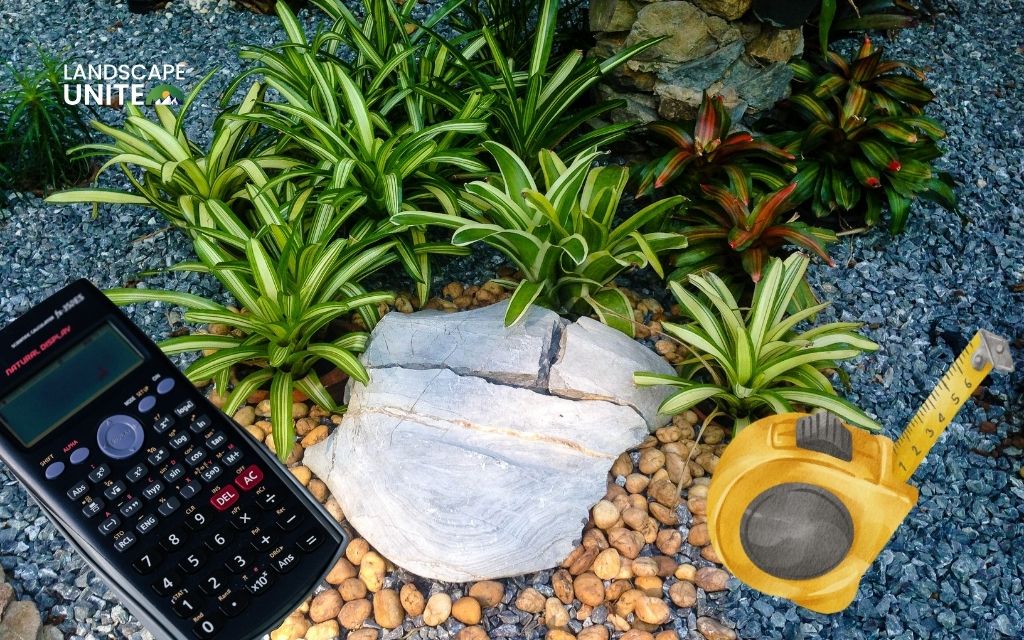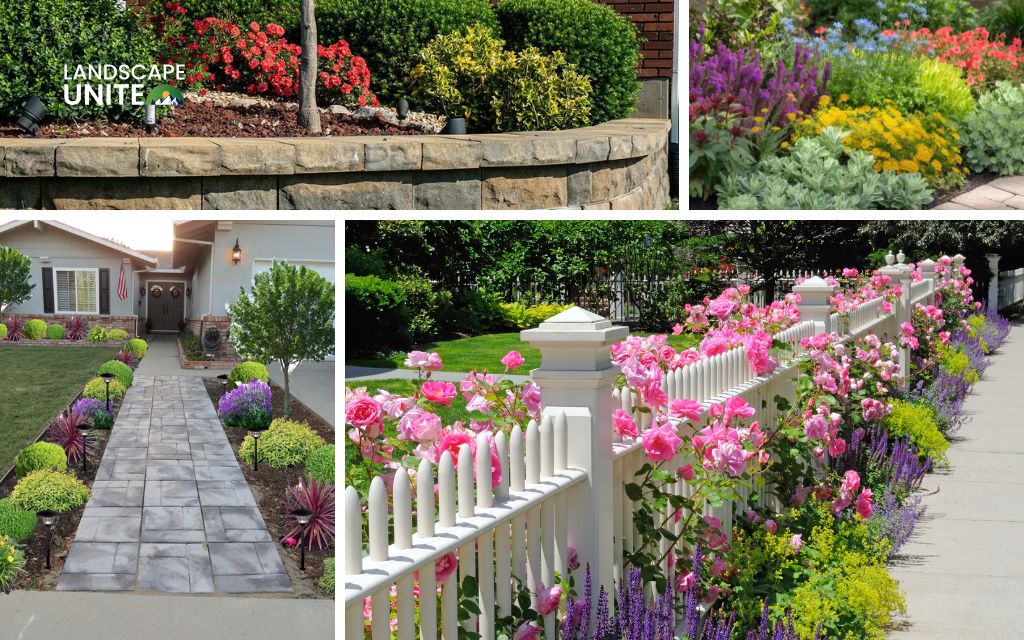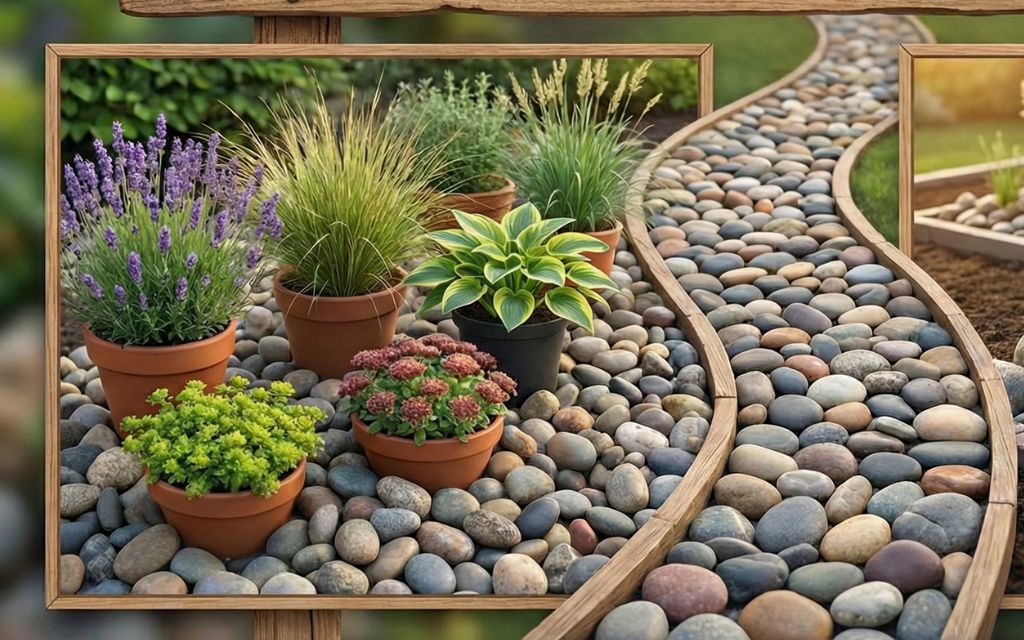When heavy rain hits, does your yard turn into a small lake? Thousands of homeowners across the United States struggle with poor drainage, standing water, and erosion that threatens both their landscape and their home’s foundation.
2 effective drainage solutions many people choose are dry creek bed vs French drain – but which one is right for you?
In this 2025 guide, we’ll break down how each system works, their pros and cons so you can make a confident choice for your home. Whether you’re dealing with a soggy backyard, foundation concerns, or erosion on a slope, you’ll know exactly which solution fits your situation by the end of this article.
What is a dry creek bed?
Definition and function
A dry creek bed (or dry river bed) is a shallow trench filled with decorative rocks, gravel, and sometimes boulders that channels surface water runoff away from problem areas.
Think of it as a carefully designed path that water follows during rainstorms, mimicking how a natural stream moves through the landscape.
When it’s not raining, a natural dry creek bed serves as an attractive landscape feature. When storms arrive, it springs into action, guiding rushing water safely away from your home, preventing erosion, and reducing puddles.
Many homeowners line their creek beds with native plants, ornamental grasses, and even small bridges to create a naturalistic garden feature that guests admire, never realizing it’s actually a drainage system.
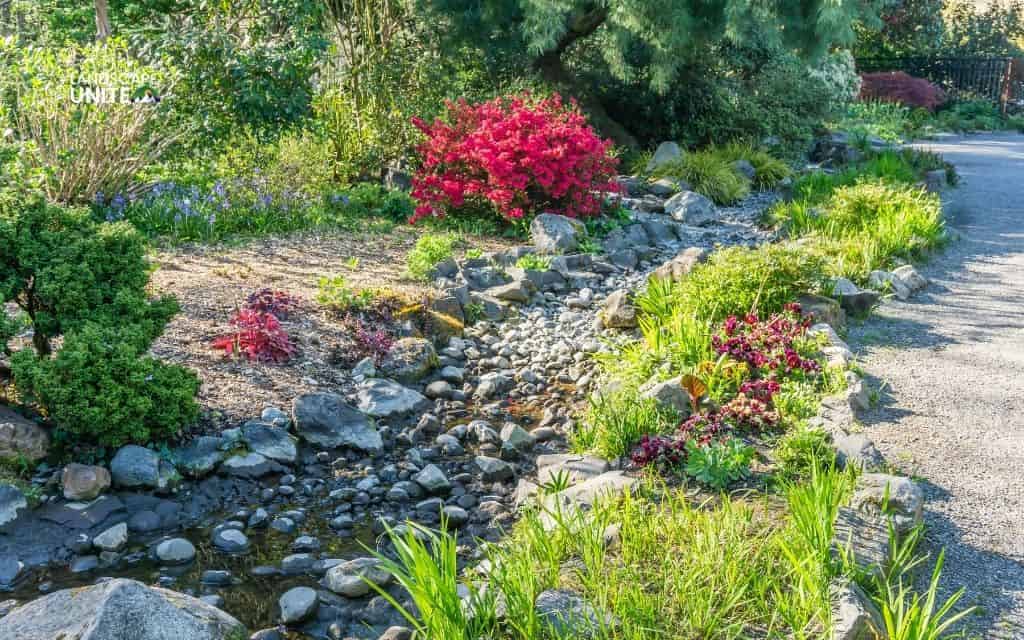
Key features
What makes a dry creek bed distinct from other drainage solutions? Here are the defining characteristics:
- Surface-level drainage system: A dry creek bed sits on top of the soil rather than buried beneath it. Water flows over and through the rocks, following the natural grade of your property.
- No pipe or limited pipe use: Unlike more complex systems, most dry creek beds rely purely on gravity and proper grading. Some homeowners choose to install a perforated pipe beneath the rocks for additional capacity, creating a hybrid system, but the traditional design uses only stone and strategic placement.
Blends into landscape design for aesthetic appeal: By selecting rocks that complement your home’s style and incorporating plants along the edges, you create what appears to be a natural water feature. It’s drainage that enhances curb appeal rather than detracting from it.
What is a French drain?
Definition and function
A French drain is a subsurface drainage system made up of a perforated pipe surrounded by gravel and wrapped in filter fabric.
The name might suggest French origins, but it’s actually named after Henry French, a 19th-century American judge who popularized the technique in his farming practices.
Here’s how it works:
- Water naturally seeps downward through soil due to gravity and saturation.
- A French drain intercepts this underground water flow at a specific depth, collecting it through small holes in the pipe.
- The gravel surrounding the pipe provides a pathway for water to reach those holes while the fabric prevents soil from clogging the system.
- Once collected, the water flows through the pipe to a designated exit point – typically a dry well, storm drain, or the street.
This system excels at redirecting groundwater and excess rainwater away from structures and soggy areas where water tends to pool below the surface.
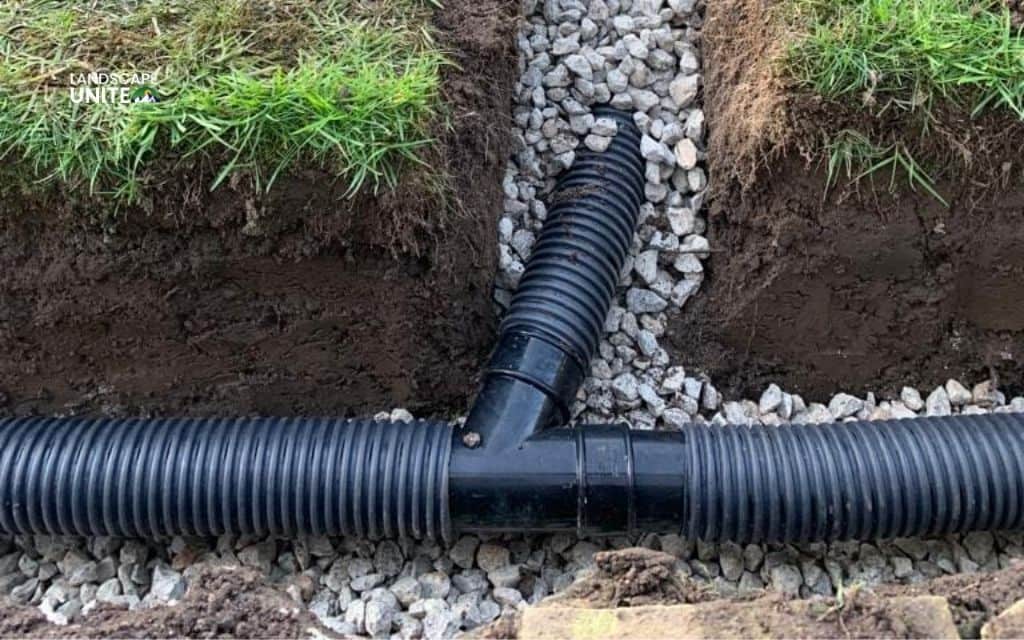
Key features
French drains are defined by several key characteristics that make them effective for subsurface water management:
- Installed underground: The entire system sits below ground level, typically at a depth of 18 to 36 inches depending on your property’s needs. This depth allows it to intercept water that has already soaked into the soil, catching it before it creates permanently soggy areas in your lawn.
- Uses perforated pipe to collect and move water: The perforated pipe (usually 4 inches in diameter and made from rigid PVC or flexible corrugated plastic) is the heart of the system. Small slits or holes allow water to enter while the pipe’s continuous downward slope ensures water keeps flowing toward the exit point without backing up.
Typically drains into a dry well, swale, or storm system: A French drain needs somewhere to send the water it collects. Common endpoints include underground dry wells (gravel-filled pits that allow gradual absorption), surface swales (shallow ditches), municipal storm drains, or simply daylight discharge at the lowest point of your property where water can safely exit.
What’s the difference between dry creek bed vs French drain?
Understanding the fundamental differences between these two systems is crucial for making the right choice. While both manage water, they operate in completely different ways:
The most important distinction is where each system intercepts water:
- A dry creek bed catches water as it flows across the surface – think of gutters overflowing, rain washing down a slope, or runoff from your driveway. It’s immediately visible drainage that redirects water before it causes problems.
- A French drain, conversely, works below ground where you can’t see it. It addresses water that has already soaked into the soil and is creating saturation problems, whether that’s a muddy area, foundation seepage, or a basement that smells damp after every rain.
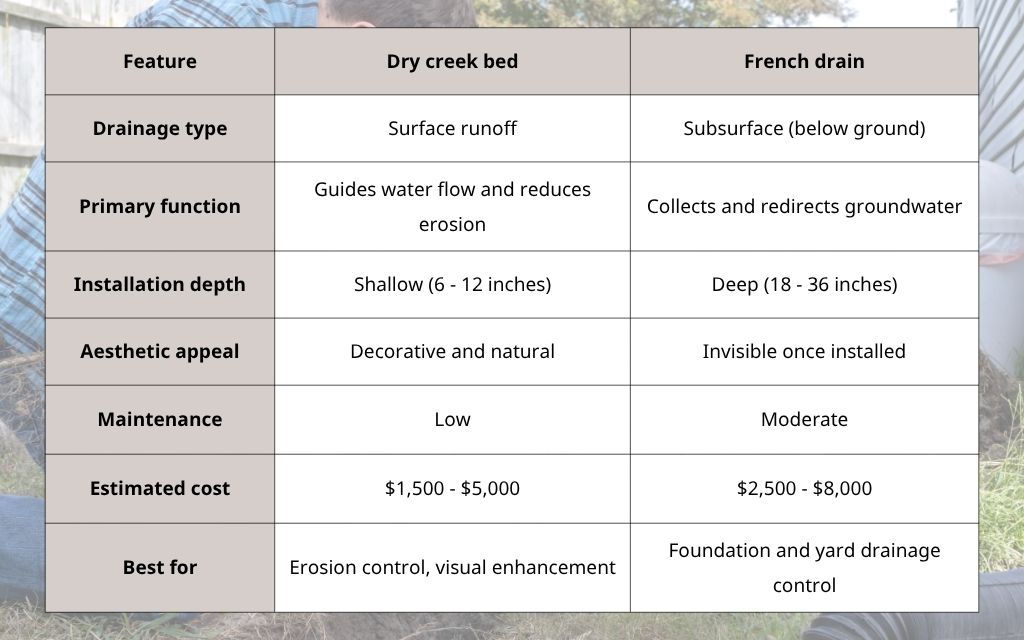
How to decide – dry creek bed vs French drain?
Choose a dry creek bed if…
- You have surface water issues (runoff, puddles, or mild erosion): If you see water rushing across your lawn during rainstorms, gutters overflowing and creating channels, or puddles that form on hard surfaces and disappear within hours, you’re experiencing surface drainage problems.
- You want a natural landscape feature that doubles as drainage: If you’re planning a garden renovation anyway or you want your drainage solution to add property value rather than just solve a problem, a creek bed delivers both function and beauty.
- You prefer low maintenance and DIY-friendly installation: For homeowners comfortable with basic landscaping tasks, a dry creek bed is achievable over a weekend or two. Maintenance is equally straightforward – rake out leaves in the fall, remove debris after storms, and add fresh gravel every few years.
Choose a French drain if…
- You have standing water that persists for days after rain: If puddles or muddy spots remain in your yard long after the rain stops, you’re dealing with poor soil drainage and high water tables. This water has already soaked in and has nowhere to go.
- Water collects near your home’s foundation or basement: If you notice damp basement walls, a musty smell, foundation cracks, or standing water against your foundation after rain, a French drain around the perimeter can intercept water before it reaches your home. This is perhaps the most critical reason to choose a French drain.
- You want a long-term, engineered drainage system for reliability: French drains are a permanent infrastructure solution. If you’re dealing with clay soil, a high water table, or chronic drainage issues that need a guaranteed fix, the engineered approach of a French drain provides that reliability.
| Feature | Dry Creek Bed | French Drain |
| Water management | Surface water, snowmelt | Subsurface, groundwater |
| Visual impact | Decorative, xeriscape-friendly | Invisible, preserves views |
| Colorado soil suitability | Works in most soil types | Requires clay soil amendments |
| Freeze-thaw resistance | Excellent (stone construction) | Good (below frost line) |
| Installation cost | $5-7 per linear foot | $20-30 per linear foot |
| Maintenance needs | Seasonal debris removal | Professional inspections |
| Permit requirements | Rarely required | May need Denver permits |
| DIY potential | Possible with proper grading | Professional installation required |
| Lifespan in Colorado | 15-20 years | 10-15 years |
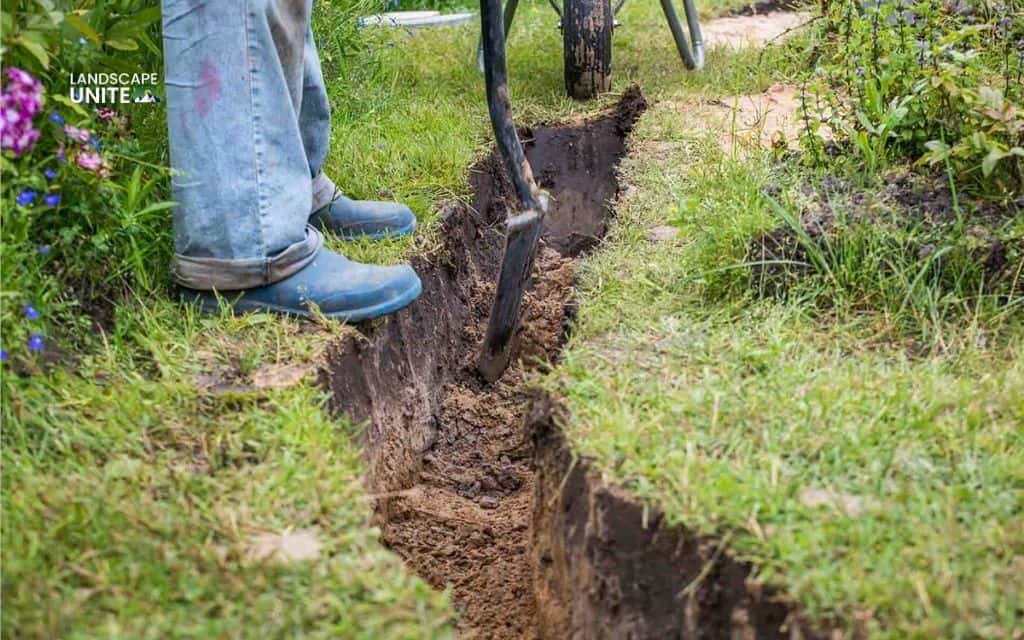
Benefits of a dry creek bed
When properly installed, a dry creek bed offers advantages that extend beyond simple water management:
Visually appealing
Unlike utilitarian drainage solutions that you want to hide, a dry creek bed becomes a garden feature. You can create a winding path of varied stone sizes, add river birch or ornamental grasses along the edges, and even incorporate a small footbridge.
Controls surface erosion on slopes
If your property has any grade to it, erosion is a constant battle. Heavy rain washes soil downhill, creating gullies and exposing roots.
A dry creek bed intercepts this erosion at its source, slowing water velocity and giving it a designated path. The rocks dissipate energy, preventing the cutting action that causes gullies.
Low maintenance
Because everything is visible on the surface, you always know how your drainage system is performing. After a storm, walk along the creek bed to see where water flowed and whether any rocks shifted.
Annual maintenance typically involves removing leaves and debris, maybe raking the stones smooth, and adding a wheelbarrow of fresh gravel to areas that have settled.
No piping or complex materials needed
The simplicity is refreshing in a world of complicated systems. You need landscape fabric, various sizes of rock, and proper grading. That’s it. No perforated pipe to install correctly, no worry about slopes and flow rates, no underground connections to maintain.
Environmentally friendly
While guiding water away from problem areas, a dry creek bed allows gradual infiltration into the surrounding soil. This recharges groundwater naturally and prevents overwhelming storm drains with sudden runoff.
The rock and gravel slow water down, giving it time to soak in rather than rushing directly into waterways and potentially causing downstream flooding.
Benefits of a French drain
French drains excel at solving problems that surface solutions simply can’t address:
Prevents basement and foundation flooding
This is the primary reason many homeowners invest in French drains. By intercepting groundwater before it reaches your foundation, you eliminate hydrostatic pressure that forces moisture through basement walls and floors. A perimeter French drain around your home’s foundation can save you thousands in water damage repairs and mold remediation.
Effective in clay or poorly draining soils
Some soil types, particularly heavy clay common throughout much of the United States, drain very slowly. Water gets trapped in the upper soil layers, creating muddy areas and unhealthy conditions for lawns and plants.
A French drain cuts through this problem, providing a fast-draining pathway through gravel even when the surrounding soil is saturated.
Works automatically during rainfall
There’s no maintenance required for a French drain to function during a storm. A properly installed French drain simply collects and moves water 24/7 without any intervention.
This reliability is particularly valuable for vacation homes or rental properties where you can’t respond immediately to every weather event.
Can be connected to downspouts or sump pumps for added control
One of the most powerful features of French drains is their versatility. You can route your gutter downspouts directly into the French drain system, preventing roof runoff from pooling near your foundation.
Similarly, basement sump pumps can discharge into the French drain, ensuring that pumped water is carried far from your home rather than simply creating a muddy area near the pump outlet.
Disadvantages to consider
No drainage solution is perfect for every situation. Understanding the limitations helps you plan appropriately:
| System | Potential downsides | How to minimize |
| Dry creek bed | May clog with debris or silt | Rake out rocks and clean annually; use landscape fabric underneath; plant ground covers nearby to stabilize soil |
| Not effective for deep groundwater | Combine with subsurface drains if you have both surface and groundwater issues | |
| French drain | Higher cost and labor | Get multiple quotes from contractors; combine with surface grading to reduce needed capacity |
| Difficult to repair if buried | Use clean-out ports every 50 feet; choose quality materials initially; keep good installation records |
Additional considerations for dry creek beds:
- They require adequate space in your landscape. A creek bed that’s too narrow or shallow won’t handle heavy rain events.
- You also need a logical place for water to exit. Plan the full water pathway from source to destination.
Additional considerations for French drains
- Over time, fine soil particles can migrate through fabric and partially clog the gravel or pipe, reducing efficiency. Using high-quality non-woven geotextile fabric helps, but it’s not a permanent prevention.
- In areas with heavy tree root presence, roots may eventually find and penetrate the pipe, particularly if you use corrugated plastic rather than rigid PVC.
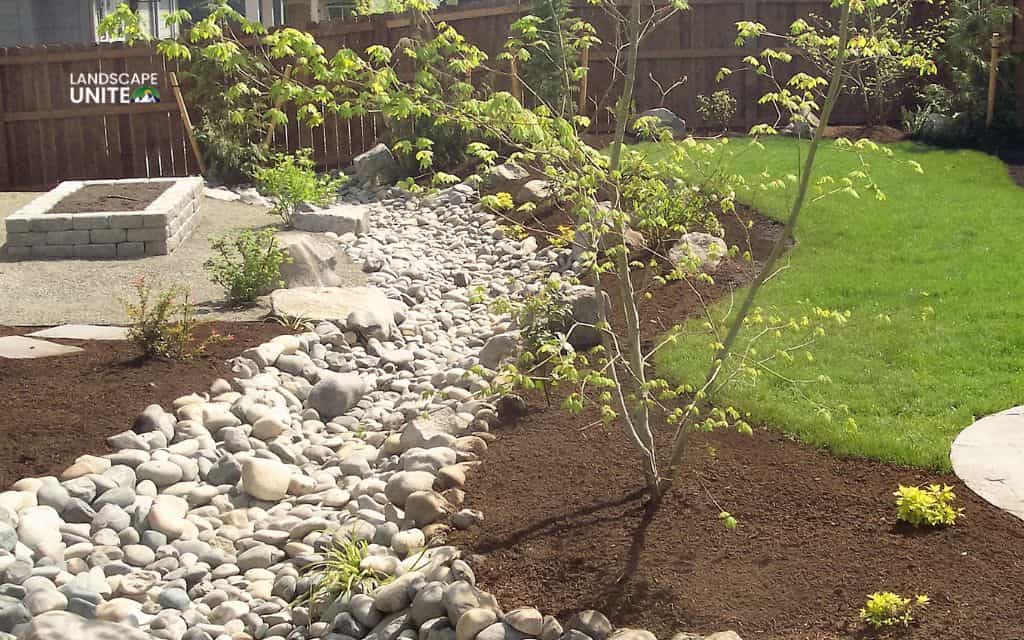
Mistakes to avoid
Learn from common errors that compromise drainage effectiveness:
Installing a French drain without proper slope
French drains rely entirely on gravity. The pipe must slope continuously downward at a minimum of 1% grade (1 inch of drop for every 8 feet of length). Even short sections that run level or uphill create places where water stagnates and sediment accumulates.
Using landscape fabric that clogs easily
Not all landscape fabric is created equal. The cheap woven fabric sold at big-box stores for weed prevention will clog quickly with fine soil particles when used in drainage applications.
For a French drain or beneath a dry creek bed, invest in non-woven geotextile fabric specifically designed for drainage. It costs more but remains permeable far longer.
Building a dry creek bed too shallow
A decorative creek bed with 3 – 4 inches of stones looks nice but fails during significant storms.
As a general rule, your creek bed should be 12 – 18 inches wide and 8 – 12 inches deep to handle typical residential drainage.
For larger properties or areas with heavy runoff, go bigger. It’s better to over-build capacity than to watch water overflow during the storm you built it for.
Ignoring runoff sources
Before installing any drainage system, address the source of excess water:
- Are gutters overflowing because they’re clogged?
- Is your yard graded toward the house instead of away?
- Does your driveway funnel water into your yard?
Fix these issues first, and you may find you need a smaller, less expensive drainage solution than you originally thought.
Forgetting maintenance
Many homeowners install drainage and forget about it for years until problems develop. A quick annual inspection takes 15 minutes and can prevent major failures.
Walk your drainage systems after a rain to verify everything is functioning, clear any visible blockages, and make minor adjustments before small problems become expensive repairs.
Combining pipeless french drain concepts incorrectly
Some installations attempt a “pipeless french drain” – a deep trench filled with gravel but no pipe. While this can work for light drainage in small areas, the lack of pipe means water moves more slowly through the gravel and the system’s capacity is significantly reduced.
Conclusion
Choosing between a dry creek bed vs french drain depends on your property’s unique drainage challenges. If you need aesthetic erosion control for surface water, go with a dry creek bed. It’s attractive, DIY-friendly, and effectively guides runoff away from problem areas.
If you’re dealing with deep or persistent water near your foundation or basement, choose a French drain. This subsurface system reliably intercepts groundwater and protects your home’s structural integrity.
For the best long-term results – consider combining both systems. A French drain beneath a dry creek bed addresses multiple drainage issues while maintaining visual appeal.
Ready to transform your yard with effective drainage solutions? Explore our landscape knowledge base for expert guides, seasonal maintenance tips, and practical yard water management strategies!
Frequently asked questions (FAQs)
Do dry creek beds actually work for drainage?
Yes. They guide runoff effectively on slopes and prevent erosion when properly installed with adequate width (12 -18 inches) and depth (8 – 12 inches). However, they only address surface water, not groundwater issues.
Can I install a French drain myself?
It’s possible, but professional installation ensures correct slope (minimum 1% grade), proper filtration, and longevity. Common DIY mistakes include improper grades and using wrong materials. For foundation installations, hire a professional.
What’s cheaper – a French drain or a dry creek bed?
Dry creek beds are typically 30 – 40% cheaper ($1,500 – $5,000 vs $2,500 – $8,000) but less effective for deep drainage. Choose based on your specific water problem, not just cost.
Can I combine both systems?
Absolutely. Many homeowners install a French drain under a dry creek bed for dual benefits. This addresses both surface runoff and subsurface groundwater effectively.
How long do these drainage systems last?
Dry creek beds: 10 – 20 years; French drains: 20 – 30 years with proper maintenance. Lifespan depends on installation quality, materials used, and regular upkeep.
